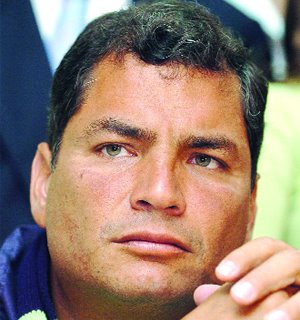
There are striking similarities between Correa and Obama, but while Obama seeks consensus, Correa confronts.
A new generation has come to power in Ecuador and the U.S and their presidents are greatly similar. The 47-year old Barack Obama and the 20-months younger Rafael Correa succeed leaders who are between 15 and 20 years older.
They are better prepared than their predecessors. Obama has the best education America can offer: a Harvard Law Degree. Correa is Ecuador’s first president with a First World education: a Masters earned in Lovania and a PhD from the University of Illinois, both in Economics. Both are in command of situations that seasoned politicians regard as “technical” and which they have little experience.
Obama and Correa both present themselves as springing from the ranks of the less privileged, claims which are only half-truths. True, Obama is black, and only 50 years have passed since racial discrimination was illegal throughout the United States of America. But his blackness is only skin deep – Obama was brought up by his white maternal family and his training is vastly different from that of the black movement leaders in the U.S. Barack Obama’s racial identification is a product of his choice as an adult.
On his part, Correa emphasizes the harsh circumstances of his childhood although culturally he is upper middle class and the values and education he received at home are what enabled him to rise so quickly. There are presently business leaders who experienced similar constraints in their youth.
Correa and Obama both exhibit their generation’s sensitivity toward environmental issues, gender and racial minority rights. Obama nominated a Hispanic woman to the Supreme Court and promises to stimulate “green” industries. As for Correa, these sensitivities are more pronounced in other members of Alianza Pais (Rafael Correa‘s new political movement).
Barack and Rafael share an aversion to the variant of capitalism that has prevailed during the last 20 years, a time during which Thatcher and Reagan led free market economies and the state became a hindrance to economic development.
Both presidents seek to strengthen the state’s role in the economy. They believe that lack of regulation disproportionately benefited the wealthier, and that it brought about the respective banking crises in each country.
But there is a great difference. Obama seeks support for his policies and has pushed for his vision to be the new center for American politics and the American people, much like Franklin Roosevelt New Deal after the Great Depression of the 1930s.
Whether for ideological reasons, personality or characteristics particular to Ecuador, Correa seeks confrontation. He has made enemies of those professionals, merchants and ordinary citizens who seek a more equitable economic environment and, in doing so, risks the rise of animosity and the growth of an alternative government for Ecuador.

Leave a Reply
You must be logged in to post a comment.